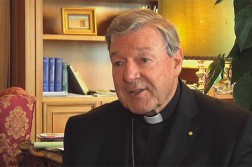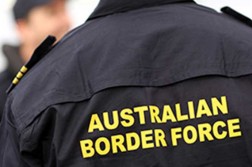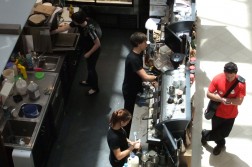I was most saddened this week to hear of the untimely death of Senator Edward Kennedy, a man who has been one of my foremost political heroes ever since I first read his obituary. In many ways it was more than the death of just one man, and I am not referring here to the Senator’s weight; I believe one should wait at least two weeks before deriving amusement from the obesity of the recently deceased.
No, I am referring to what Ted Kennedy represented: the end of a dream, the end of an era, the end of a dynasty that had illuminated and inspired the world for half a century. Sadly, that is all done with now; he was the last of the Kennedys — apart from the ones who are left — and thus we mourn not just a man, but an institution.
And yet, here in Australia we know so little of the legend of the Kennedys. This is not surprising. When your own country’s political culture is as gripping and colourful as Australia’s, it’s no great shock that the citizenry can’t be bothered learning the ins and outs of foreign nations’ politics or history or location.
Still, it is instructive to take the opportunity to look at the extraordinary story of Ted Kennedy and his family, a family which changed the world in ways we can barely imagine or care about, and whose inspirational and yet tragic story has so much to teach us about the dizzying highs (political power, wealth, extra-marital sex) and crushing lows (getting shot) of a life lived in the public spotlight.
Ted was the fourth son of Joe and Rose Kennedy, a powerful and influential couple who brought together in perfect synthesis the noble Irish Catholic traditions of social activism and organised crime. Their first son, Joseph Junior, was killed in World War II, which in retrospect proved to be a fairly prudent move all things considered.
Their second son, of course, was the legendary John "Fitzgerald" Kennedy, a man whose youthful idealism was matched only by his determination to succeed; whose passion for freedom was matched only by his world-changing ideas; whose all-consuming prescription drug addiction was matched only by his pathological urge to humiliate his wife with a constant stream of sexually available young women.
Of such qualities are all great men made, and "JFK", as he was cutely dubbed by members of the media who struggled with his complex and ethnic full name, was one of the greatest. His greatness was obvious even before he became president, when he won the Pulitzer Prize for Profiles in Courage, a book to which some historians contend JFK contributed as much as 80 per cent of the title. And as president, he brought hope to a world that was weary and cynical after the war and the uptight ’50s and the burgeoning horror of Elvis Presley’s movie career. To see this dashing young fellow stand up before the world, flash a winning smile, and utilise daring new syntactical inversions like "ask not" was a breath of fresh air. Which only made it all the more painful when he was taken away from us by an assassin’s bullet.
Who would we turn to now, we asked? Who now would promise to go to the moon, or speak awkward German, or engage in disastrously amateurish foreign policy adventurism? Who? Nobody, sadly.
It was during JFK’s reign that the image of "Camelot" became a popular one to identify the Kennedys with, inspired by the president’s enormous table and the first lady’s habit of living in a lake. Of course, we now know that Camelot was in large part a myth, but at the time it was a romantic testimony to the inherent gullibility of the population of 1960s America.
The Camelot myth was driven greatly by JFK’s charismatic wife Jacqueline, dubbed "Jackie O" due to her skill with polygraphs. It is a strange fact that much of the glamour of the Kennedys has come from those who marry into the family. Another example is well known governor/barbarian Arnold Schwarzenegger, who became a part of the Kennedy family by marrying Maria Shriver, who is Joe Kennedy’s niece’s daughter’s cousin’s aunt’s husband’s postman’s grandmother.
After JFK was assassinated on 22 November 1963 by a combination of bullets from 18 separate shooters, three machetes hurled by Ugandan dissidents, a poisoned milkshake and a crippling attack of gout, the mantle of "Kennedy most likely" passed to younger brother Bobby, who was, after John’s death, the most qualified man to lead America — as measured in ability to arrange movie stars’ fake suicides. Unfortunately, before Bobby could fulfil his obvious destiny and become president himself, he too was assassinated, by one Sirhan Sirhan, a Palestinian immigrant driven mad by the US government’s repeated refusal to grant him more than one name. Bobby’s tragic demise, of course, led to the presidency of Richard Nixon, which led to Watergate, thus destroying journalistic originality for all time, so Sirhan Sirhan has a lot to answer for.
And of course, once John and Bobby were gone, Ted became the anointed one, the Messiah who was expected to carry the torch of hope into the future. And for a while, it looked like he just might do it — until Chappaquiddick. Although Chappaquiddick is today widely believed to be a briefly popular synth-pop band from the 1980s, it is in fact a small island in Massachusetts, and the scene of the end of Ted Kennedy’s presidential aspirations.
It was a dark July night in 1969, when the surviving senator Kennedy gave a lift to 19-year-old Mary Jo Kopechne, a seemingly kind act borne of simple chivalry and the innocent desire for an extra-marital fling with a teenager. However, as good intentions so often do, it ended with Kennedy drunkenly driving the car off a bridge and the young lady drowning.
It’s difficult to understand now, but back in the more morally constrained 1960s, causing the death of a young woman before fleeing the scene and failing to report the accident was seen as detrimental to a political career, and so the world was denied another Kennedy in the White House — although I’m sure some of them have visited from time to time.
Not that Ted left the political scene. At the time of his death this week, in fact, he had been serving as a US senator for 47 years, during which time he achieved many important reforms and pushed through many vital pieces of legislation, the details of which escape me at this present time, but which you can easily find by Googling "Ted Kennedy boring".
He became known as the "Lion of the Senate" because of his political courage and repulsive table manners, and was seen as the elder statesman of the Democratic Party, gaining fame for the way in which he would fight against the reactionary policies of the Republicans, best illustrated in 1995 when Newt Gingrich attempted to force through his "Contract with America", only to be thwarted when Kennedy rallied the Democrats behind him and, in a fiery debate on the Senate floor, beat Gingrich senseless with a baseball bat.
And that’s the kind of man we’ve now lost. That’s the kind of dynasty that has passed into history. Yes, we still have Kennedys scattered around the place. There’s Caroline, for example, but after John and Bobby and Ted, saying "there’s still Caroline" is rather like saying "at least I have my health" after being mugged. The Kennedy spirit has passed out of this world, and all we have are wonderful, wonderful memories, and of course Barack Obama, who in many ways is reminiscent of the Kennedy glory days, and would be a worthy successor if it weren’t for the fact that he is a Kenyan Muslim communist.
So what can we Australians learn from the Kennedys? Our political culture is so different from the US. Oh sure, we have our own "Lion of the Senate" in Sarah Hanson-Young, but we lack the kind of powerful public charisma that the Kennedys used to embody. And I suppose if Australia can take anything from the life of Ted Kennedy, it is that there is still room for idealism in politics. One can be successful while staying true to one’s principles, and retain a one-in-three chance of not being shot to death. We could use a bit more of the Kennedy heart and soul in this country, I say. If Kevin Rudd were more like John … if Wayne Swan were more like Bobby … if Tony Abbott were more like Jackie O … we would surely have a society that was more thoroughly grounded in hope, generosity, and sexy pool parties.
But this isn’t the time for in-depth analysis, as brilliant as it might be. This is a time to remember a great man, and a great family, who, no matter what they did — be it ruling the free world, debating progressive legislative proposals, or having bits of their children’s brains cut out to prevent them getting too uppity — they did it always with the utmost integrity, a sense of easy likeability, and one hand up the nearest female’s skirt.
Who could deny we need a bit more of that today?
Donate To New Matilda
New Matilda is a small, independent media outlet. We survive through reader contributions, and never losing a lawsuit. If you got something from this article, giving something back helps us to continue speaking truth to power. Every little bit counts.



